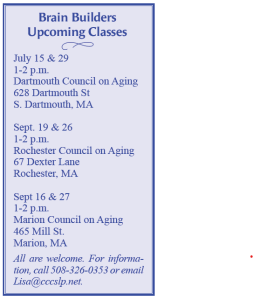On the surface of it, the 15 people gathered in a virtual meeting space wearing fancy Kentucky Derby hats, were having a fun conversation about horse racing and the recent Derby winner.
They’d placed their unofficial $2 bets the meeting before and were calculating winnings, ribbing each other on standings, and chatting about everything from racing procedure to the criteria for choosing a winning race horse.
Beyond the banter though, each participant is building skills, working to develop or redevelop cognitive, memory, or speech abilities damaged or
The conversation occasionally slows down when someone struggles to recall or say the specific word they want to. No one seems to mind. Mostly, the group lets each person take their time; although occasionally, someone takes advantage of the conversational gap to throw in a joke or good-natured heckle.
This is Brain Builders, a program created by twin sisters Lisa Yauch-Cadden and Lori Yauch, and Kari Star of Buzzards Bay Speech Pathology, as a supportive community to practice strategies they learn in treatment. Each of the women have degrees in Clinical Competence in Speech-Language Pathology.
“As a profession, we treat it all,” said Star. “Those whose speech is not clear. People whose voice is not clear, who have language problems, or can’t find words, or can’t formulate words. They can have processing disorders, or can’t understand what they hear or what they read.”
They also treat stuttering and social issues where people may not be good in conversation with others or in social interactions.
“We believe speech pathology in general uses communication, language and cognition,” said Yauch. “When my job is from the neck up, I (support)
you on your speech, your listening skills, your ability to understand, and your ability to remember what you understand.”
The women teach strategies that allow people to compensate for a specific challenge. Any individual Brain Builders class might focus on a single strategy yet also allow each person to approach the challenge and compensate in different ways.
For example, a strategy might use visual storytelling to improve memory, creating a mental story to help someone remember their grocery list or similar information.
People in the class can have various concerns, including Parkinsons or Multiple Sclerosis, a dementia, head injury or stroke and still benefit, the Brain Builders team said. In fact, bringing people together who have different challenges creates an environment where everyone can learn from each other in the group, they said.
“All of a sudden, they’re all talking and they realize we are all the same,” said Yauch-Cadden.
Brain Builders’ virtual community has grown into a safe space with individuals who have been attending for years and have gotten to know each other well.
“It’s a judgment free zone,” said Yauch-Cadden. “It’s a place where people feel free to communicate with us in whatever form they can. We are here to help.”
The class is also held in person in shorter sessions at local senior centers.
“Most of the seniors are concerned about their memory,” said Yauch. “So each week we introduce a (memory) strategy and practice that.”
“By the time you get through the Brain Builders memory class, you have a handful of strategies which you can apply to different settings,” she said.
Practicing is important which is why doing group activities together and trying our strategies is important. This way, people can identify and practice the strategy that works best for them.
For example, if someone isn’t a visual learner, they may not want to try the storytelling strategy. Instead they may prefer using alphabetical cues as a memory support.
“The beauty is that we have so many (strategies),” said Star. “You can find what works for you and keep coming back.”

Recent Comments